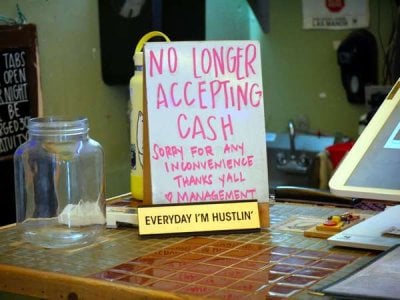Are Today's Digital Payments Leaving Our Seniors Behind? Find Out!
From the healthcare industry to communication and even grocery shopping, digitalisation has become increasingly prevalent.
At the Seniors Discount Club, we closely monitor a notable development: the banking industry's rapid transition towards a cashless society.
As our world increasingly relies on digital technologies, there is a growing movement within the banking industry to reduce the reliance on physical cash.
However, it's important to consider the perspectives of individuals who may find this shift challenging.

Chris Grice, the Chief Operating Officer at National Seniors Australia, recently expressed concerns about the increasing push to discourage cash usage.
‘The feedback we're getting it is not as easy as, you know, just tap and go and away you go,’ he said.
Tap-and-go payments may seem convenient for some, but they present an unwelcome challenge for others, particularly when internet connectivity is sporadic, as is often the case in rural Australia.
The cost associated with digital transactions further exacerbates the situation.
Adding fuel to the fire, there have been reports suggesting that the Commonwealth Bank has been increasing its 'cashless' branches, a move that has been met with apprehension by older citizens who find comfort in the tangibility of cash transactions.

Given these rattling reports, a spokesperson from the Commonwealth Bank issued a full statement:
They stated, ‘Cash withdrawals and deposits are available at all Commonwealth Bank branches and Specialist Centres.’
The Commonwealth Bank has created Specialist Centres in major metropolitan areas to provide personalised support for customers with more complex banking needs.
They added, ‘These Specialist Centres provide customers with face-to-face access to specialist home and business lenders and also offer the latest self-service technologies. All of our Specialist Centres are in major metropolitan locations and very nearby to full-service branches.’
‘We continue to maintain Australia's largest branch network for customers.’

In light of this, we must ask ourselves: Do these Specialist Centres do enough to bridge the digital divide for our citizens?
Navigating the digital world can be overwhelming for those accustomed to traditional banking methods.
While technological progress is inevitable and often beneficial, it is crucial to balance embracing advancements and ensuring inclusion for all.
Amid the efforts to move towards a cashless society, honouring those with differing preferences regarding handling money is also important.
Members, what are your thoughts on the increasing shift towards digital payments and the potential impact on individuals who may face challenges with this transition? Do you believe enough is being done to support you in the digital banking landscape?
At the Seniors Discount Club, we closely monitor a notable development: the banking industry's rapid transition towards a cashless society.
As our world increasingly relies on digital technologies, there is a growing movement within the banking industry to reduce the reliance on physical cash.
However, it's important to consider the perspectives of individuals who may find this shift challenging.

The shift towards a cashless society has created significant challenges for those who rely on cash as their primary form of payment, such as the unbanked and elderly populations, exacerbating financial exclusion and limiting their access to essential goods and services. Image by naipo_de from Unsplash
Chris Grice, the Chief Operating Officer at National Seniors Australia, recently expressed concerns about the increasing push to discourage cash usage.
‘The feedback we're getting it is not as easy as, you know, just tap and go and away you go,’ he said.
Tap-and-go payments may seem convenient for some, but they present an unwelcome challenge for others, particularly when internet connectivity is sporadic, as is often the case in rural Australia.
The cost associated with digital transactions further exacerbates the situation.
Adding fuel to the fire, there have been reports suggesting that the Commonwealth Bank has been increasing its 'cashless' branches, a move that has been met with apprehension by older citizens who find comfort in the tangibility of cash transactions.

The digital divide and technological barriers further widen the gap, making it clear that the transition to a cashless society is far from inclusive and raises concerns about leaving vulnerable communities behind. Image from Flickr
Given these rattling reports, a spokesperson from the Commonwealth Bank issued a full statement:
They stated, ‘Cash withdrawals and deposits are available at all Commonwealth Bank branches and Specialist Centres.’
The Commonwealth Bank has created Specialist Centres in major metropolitan areas to provide personalised support for customers with more complex banking needs.
They added, ‘These Specialist Centres provide customers with face-to-face access to specialist home and business lenders and also offer the latest self-service technologies. All of our Specialist Centres are in major metropolitan locations and very nearby to full-service branches.’
‘We continue to maintain Australia's largest branch network for customers.’
Key Takeaways
- There are concerns that some Australians could be disadvantaged as the banking industry shifts towards digital transactions.
- National Seniors Australia's Chief Operating Officer has mentioned challenges around internet access in regional communities and the difficulties some face adapting to 'tap and go' transactions.
- Commonwealth Bank has reportedly increased the number of 'cashless' branches, raising concerns about increased transaction fees at ATMs and the loss of cash services for older Australians.
- In response, a Commonwealth Bank spokesperson clarified that cash withdrawals and deposits are available at all branches and Specialist Centres and have the largest branch network for customers in Australia.
In light of this, we must ask ourselves: Do these Specialist Centres do enough to bridge the digital divide for our citizens?
Navigating the digital world can be overwhelming for those accustomed to traditional banking methods.
While technological progress is inevitable and often beneficial, it is crucial to balance embracing advancements and ensuring inclusion for all.
Amid the efforts to move towards a cashless society, honouring those with differing preferences regarding handling money is also important.
Members, what are your thoughts on the increasing shift towards digital payments and the potential impact on individuals who may face challenges with this transition? Do you believe enough is being done to support you in the digital banking landscape?







